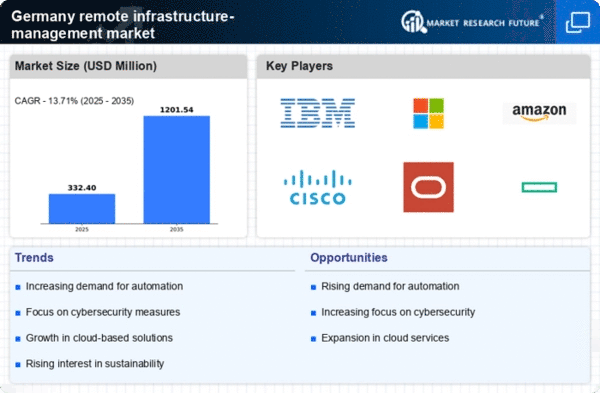Shift Towards Hybrid Work Models
The shift towards hybrid work models in Germany is significantly influencing the remote infrastructure-management market. As organizations adapt to flexible work arrangements, the need for robust remote management solutions becomes increasingly apparent. Companies are investing in technologies that support remote access to infrastructure, enabling employees to work efficiently from various locations. This trend is reflected in a survey indicating that over 60% of German companies plan to implement hybrid work policies in the coming years. The remote infrastructure-management market is poised to benefit from this transition, as businesses seek solutions that facilitate seamless connectivity and collaboration among remote teams.
Growing Demand for Cost Efficiency
The remote infrastructure-management market in Germany is experiencing a notable surge in demand for cost efficiency.. Organizations are increasingly seeking ways to optimize their operational expenditures, which has led to a heightened interest in remote management solutions. By leveraging these services, companies can reduce the need for on-site personnel and infrastructure, thereby lowering costs. According to recent data, businesses that implement remote management solutions can achieve savings of up to 30% in operational costs. This trend is particularly pronounced among small to medium-sized enterprises (SMEs) that are looking to maximize their budgets while maintaining service quality. As a result, the remote infrastructure-management market is likely to expand as more organizations recognize the financial benefits associated with these solutions.
Regulatory Compliance and Data Protection
In Germany, stringent regulations regarding data protection and compliance are driving the remote infrastructure-management market. The implementation of the General Data Protection Regulation (GDPR) has heightened the need for organizations to ensure that their data management practices are secure and compliant. Remote infrastructure-management solutions offer tools that help businesses adhere to these regulations by providing secure data handling and storage options. Companies that fail to comply with these regulations face substantial fines, which can reach up to €20 million or 4% of their annual global turnover. Consequently, the demand for remote management services that facilitate compliance is expected to grow, as organizations prioritize data security and regulatory adherence.
Increased Focus on Sustainability Initiatives
The remote infrastructure-management market in Germany is witnessing a growing focus on sustainability initiatives. Organizations are increasingly prioritizing environmentally friendly practices, which has led to a demand for solutions that minimize energy consumption and reduce carbon footprints. Remote management technologies can contribute to these sustainability goals by optimizing resource usage and enabling more efficient operations. For instance, companies that implement energy-efficient remote management systems can reduce their energy costs by up to 25%. This alignment with sustainability objectives not only enhances corporate responsibility but also appeals to environmentally conscious consumers, further driving the growth of the remote infrastructure-management market.
Technological Advancements in Remote Monitoring
Technological advancements in remote monitoring tools are propelling the remote infrastructure-management market in Germany. Innovations such as IoT devices and AI-driven analytics are enhancing the capabilities of remote management solutions, allowing for real-time monitoring and proactive issue resolution. These technologies enable organizations to maintain optimal performance and minimize downtime, which is crucial for maintaining competitive advantage. The market for IoT devices alone is projected to grow by 15% annually, indicating a strong trend towards integrating advanced technologies into remote management practices. As organizations increasingly recognize the value of these innovations, the demand for sophisticated remote infrastructure-management solutions is likely to rise.
















